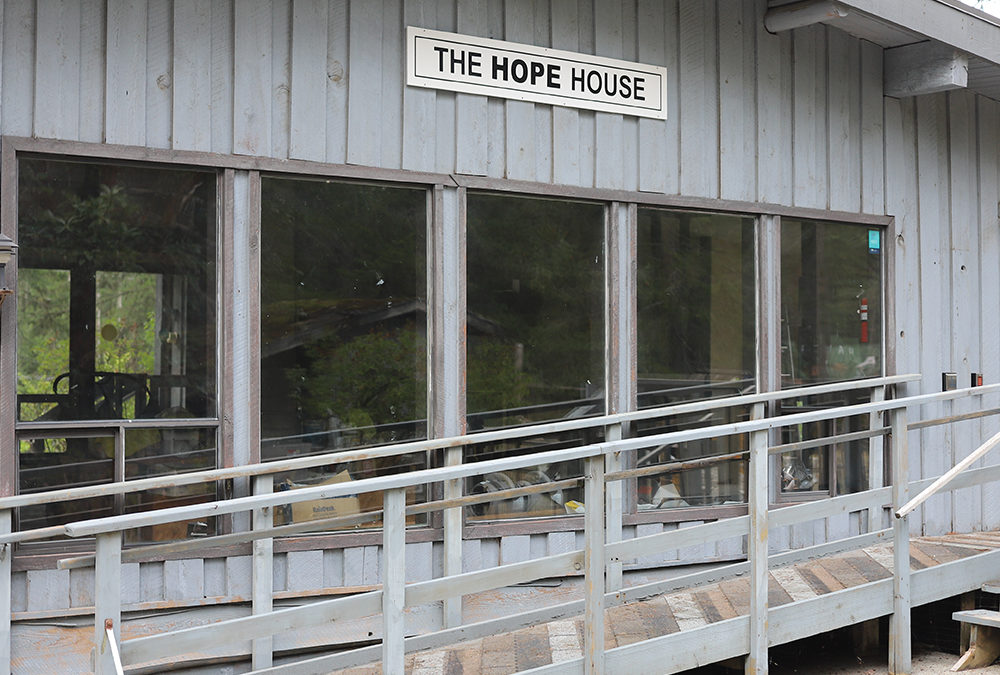HOPE Centre
Submitted Article
When Suzanne Verstraete began her role as Executive Director at The HOPE Centre in 2021, her son, who had just turned two years old at the time, was awaiting an Autism Spectrum Disorder diagnosis. This process, along with coordinating all of the different therapies and assessments he required, was a challenge. Fortunately, several of the services he needed were provided through the Child Development Centre’s Supported Child Development Program and provided on-site at The HOPE Centre’s licensed child care programs. For additional professional assessments and private services which were not available on Gabriola Island, Suzanne was not able to access many services to their fullest extent.
“Not only would I have to plan for time off work, ferry wait time, commuting time, and possible ferry delays but the aspect which was nearly impossible to plan for was my son’s potential reaction to the disruption in his daily routine”, Suzanne recalls.
Almost immediately after starting her role with The HOPE Centre, Suzanne began thinking about how this could be done differently for families. She dreamed up the ideal scenario of third party service providers being able to integrate their appointments into their child’s daycare routine. “Even with the therapy services the Child Development Centre was providing on-site, it can often be disruptive to the rest of the daycare class’ routine having the appointment take place in the class. A separate space for the child, service provider and even parent to have their appointment would be very beneficial.”
At The HOPE Centre property, there is The HOPE House which formerly facilitated one of their daycare programs. When The HOPE Learning Centre was built, that daycare program moved from the house to the new building, The HOPE House was closed and sat unused. There were extensive upgrades needing to be done before it would be suitable to facilitate any programming.
The Nanaimo Foundation offers the Community Prosperity Fund which The HOPE Centre applied for and was granted $51,000 through this fund with the purpose of renovating The HOPE House and expanding their service delivery.
The services they intend to facilitate include therapies for children with disabilities. This will allow children who attend The HOPE Centre’s daycare programs to access services on-site without their overall routine being disrupted. Having the services facilitated on-site means that families do not always have to coordinate time off of work and organize commuting on the ferry back and forth. Services will ideally include Occupational Therapy, Physical Therapy, Speech and Language Therapy, Supported Child Development Consultation, counseling and other specialized services.
The HOPE Centre also intends to begin developing the delivery of an alternative schooling group for children who currently do not thrive in a traditional public school environment. They hope to accommodate children with different needs of all ages and develop a supplemental curriculum to complement the curriculum which parents have their children registered for. The overall goal will be to have a thriving multi-age program which teaches life skills and implements both indoor and outdoor learning environments.
The timeline for these endeavors is projected to take place beginning in the winter of 2024 and be completed by March 2027 or sooner.
The HOPE Centre currently offers a Licensed Preschool and Group Child Daycare for children in their early years, as well as After School Care and Day Camps for school age children. Other programs include Mother Goose and Rughuggers which are a drop-in for parents and their young children, and there is also the Teen Drop-In program.
The HOPE Centre grant was one of nine projects sharing $635,000 in Nanaimo, Ladysmith, Cedar, Gabriola Island, and Lantzville, with the grants coming from the Nanaimo Foundation through the Government of British Columbia’s Community Prosperity Fund.
The Community Prosperity Fund is a $25 million investment from the Government of B.C. that advances poverty reduction and social inclusion.
The following projects are being supported in the Nanaimo region:
1. $225,000 to the Central Vancouver Island Multicultural Society for the Local Entrepreneurial Accelerator Program for Newcomers: training, education and professional development for aspiring entrepreneurs and small business owners who are newcomers to Canada.
2. $150,000 to the Nanaimo Association for Community Living to support administration costs including improving website to increase accessibility, purchasing software to update counselling programs, and support for staffing costs.
3. $50,000 to the Cedar Opportunities BC Society (Coco Cafe) to increase work hours for staff, and to develop essential operational and training systems.
4. $50,000 to the Growing Opportunities Farm Community Cooperative to support planning and organizational development including hiring administrative leadership.
5. $51,000 to the Gabriola Hope Centre to facilitate therapies for children with disabilities, which will allow children to access services on-site.
6. $57,000 to the Ladysmith Family and Friends Society to add a staff position focused on food equity/security and volunteer coordination.
7. $31,500 to Nanaimo Foodshare Society to provide food access programs aimed at reducing the cost of food, free home-made meals, and education.
8. $4,000 to Altrusa to provide newborn needs for low income families.
9. $16,500 to Island Deaf and Hard of Hearing Centre to support wages for Audiologist and clinic staff who will deliver the Sound of Change program, as well as new domes and ear molds, batteries, and clinic supplies.





Recent Comments